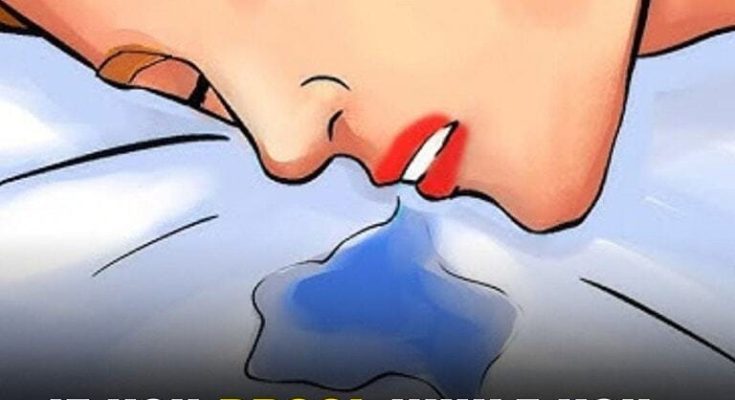10 Reasons You’re Drooling While You Sleep and What It Could Mean:
- Sleeping Position – Sleeping on your side or stomach makes saliva pool in your mouth and escape more easily.
- Nasal Congestion – If your nose is blocked (due to a cold, allergies, or sinus infection), you may breathe through your mouth, leading to drooling.
- Acid Reflux or GERD – Gastroesophageal reflux can increase saliva production as your body tries to neutralize stomach acid.
- Sleep Apnea – This sleep disorder often causes open-mouth breathing, which may result in drooling.
- Tonsillitis or Sore Throat – Infections in the throat can make swallowing painful, so saliva builds up and leaks out.
- Neurological Conditions – Disorders like Parkinson’s, stroke, or cerebral palsy can affect muscle control, including those needed to swallow.
- Medication Side Effects – Some medications increase saliva production or affect your ability to swallow.
- Allergies – Allergic reactions can lead to increased mucus and saliva production, contributing to drooling.
- GERD-related Esophageal Issues – Difficulty swallowing (dysphagia) due to esophageal problems can cause excess saliva.
- Dental Problems – Poor oral health or misaligned teeth can impact how your mouth handles saliva during sleep.
-
One of the main reasons for drooling is a blocked nose, which makes a person breathe through their mouth and may lead to drooling. Cleaning and unblocking nasal sinuses could be a good way out of having a wet pillow every night. Here are some ways that can help unclog your sinuses:
- a hot shower will clear the nose and allow normal breathing at night;
- essential oils, especially ones containing eucalyptus, will help you breathe more freely and also help you get better sleep;
- using products that help clear sinuses like Vick’s Vaporub will unclog the nose and allow for better airflow.
Also, make sure you treat any nasal infection once it appears. Otherwise, you may end up getting various complications such as an eternally clogged nose, for example.
2. Change your sleeping pose.
This might sound pretty obvious but sleeping on your back is a pose where all the saliva produced by your body stays in your mouth and doesn’t drool out. Conversely, if you sleep on your side or on your belly, the accumulated saliva will likely drip out of your mouth and on to the pillow.
If you feel it’s too difficult to stay in one position for the entire night, try tucking yourself in to stabilize your body.
3. Check for sleep apnea.
Sleep apnea is a major disorder where a person’s breathing doesn’t go as smoothly as it should. It, in turn, leads to a constantly interrupted sleep, waking up during the night, a feeling of tiredness in the morning, and a feeling of drowsiness throughout the day.Drooling and snoring are the main indicators of having sleep apnea. If you have any suspicion that you may have this disorder, contact your doctor to discuss in depth. Remember that factors like smoking increase the risk of getting the disorder and issues with breathing in general.



